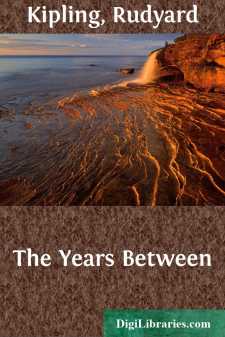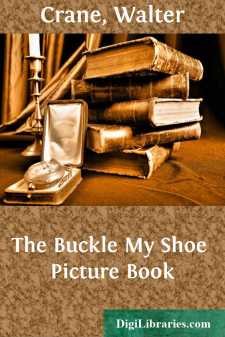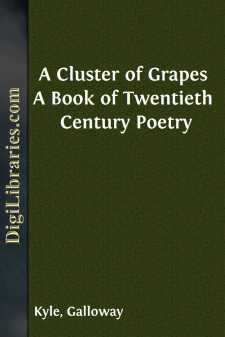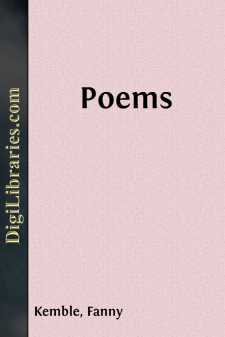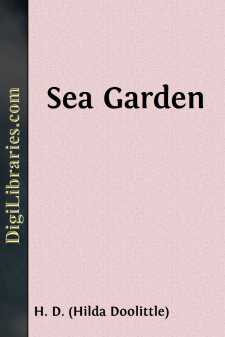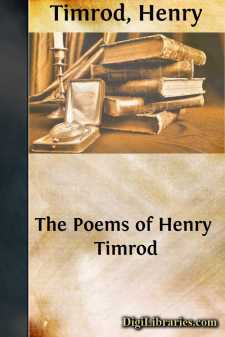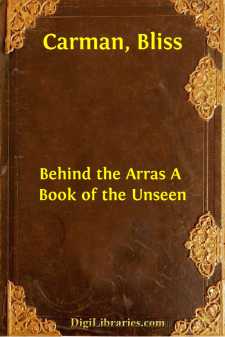Poetry Books
Sort by:
by:
Rudyard Kipling
THE ROWERS 1902 (When Germany proposed that England should help her in a naval demonstration to collect debts from Venezuela.)The banked oars fell an hundred strong,And backed and threshed and ground,But bitter was the rowers' songAs they brought the war-boat round.They had no heart for the rally and roarThat makes the whale-bath smoke—When the great blades cleave and hold and leaveAs one on the...
more...
by:
Galloway Kyle
RECONCILIATION I begin through the grass once again to be bound to the Lord; I can see, through a face that has faded, the face full of rest Of the earth, of the mother, my heart with her heart in accord, As I lie mid the cool green tresses that mantle her breast I begin with the grass once again to be bound to the Lord. By the hand of a child I am led to the throne of the King For a touch that now...
more...
INTRODUCTION.Should you ask me, whence these stories?Whence these legends and traditions,With the odors of the forest,With the dew and damp of meadows,With the curling smoke of wigwams,With the rushing of great rivers,With their frequent repetitions,And their wild reverberations,As of thunder in the mountains?10I should answer, I should tell you,"From the forests and the prairies,From the great...
more...
by:
Unknown
TOMMY TATTER.“Oh! Tommy Tatter, Tommy Tatter,Tell me now what is the matter;Tell me, Tommy, do, I pray,What makes you look so sad to-day?”“Oh! Master Peter, Peter Pink,I’ve reason to be sad, I think;Oh! don’t you see my ragged clothes,My naked legs, and naked toes,My head without a hat, to letMy hair be dry in weather wet?Oh! I am cold and hungry, too,I wish I was as rich as you!”“Oh!...
more...
by:
Fanny Kemble
August 9th, 1825. Oh, thou surpassing beauty! that dost liveShrined in yon silent stream of glorious light!Spirit of harmony! that through the vastAnd cloud-embroidered canopy art spreadingThy wings, that o’er our shadowy earth hang brooding,Like a pale silver haze, betwixt the moonAnd the world’s darker orb: beautiful, hail!Hail to thee! from her midnight throne of ether,Night looks upon the...
more...
SEA GARDEN SEA ROSERose, harsh rose,marred and with stint of petals,meagre flower, thin,sparse of leaf,more preciousthan a wet rosesingle on a stem—you are caught in the drift.Stunted, with small leaf,you are flung on the sand,you are liftedin the crisp sandthat drives in the wind.Can the spice-rosedrip such acrid fragrancehardened in a leaf? O be swift—we have always known you wanted us.We fled...
more...
by:
Henry Timrod
"A true poet is one of the most precious gifts that can be bestowed on a generation." He speaks for it and he speaks to it. Reflecting and interpreting his age and its thoughts, feelings, and purposes, he speaks for it; and with a love of truth, with a keener moral insight into the universal heart of man, and with the intuition of inspiration, he speaks to it, and through it to the world. It is...
more...
by:
Bliss Carman
Behind the Arras I like the old house tolerably well, Where I must dwell Like a familiar gnome; And yet I never shall feel quite at home: I love to roam. Day after day I loiter and explore From door to door; So many treasures lure The curious mind. What histories obscure They must immure! I hardly know which room I care for best; This fronting west, With the strange hills in view, Where the great sun...
more...
by:
Anonymous
Aladdin poor the wizard found,Who moved from cavern’s mouth a stone;Then bade him go beneath the ground,And pace through unknown realms alone,Till from a niche he bore awayA lamp—extinguishing its ray. The youth obedient instant hied,When fruits luxuriant met his sight;The white were pearls in snowy pride,Diamonds the clear—of brilliant light;For red the rubies dazzling blazed,Whereof Aladdin...
more...


